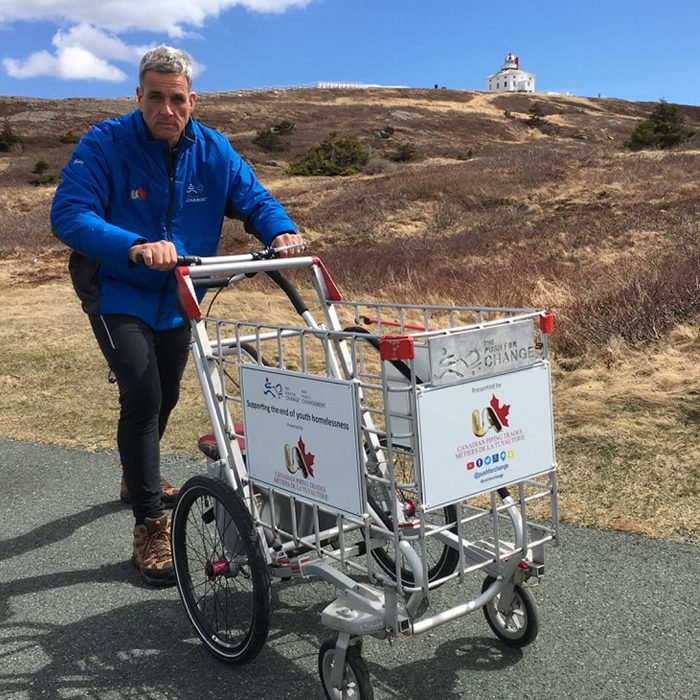
With each step he takes, pushing a grocery cart in a cross-Canada trek, Joe Roberts brings the elimination of youth homelessness one step closer.
Starting in Newfoundland May 16, Roberts began the journey he has been training for three years to undertake – a 9,000-kilometre walk to raise funds for The Upstream Project.
The project is designed to identify at risk youth while they are still in school and get them the resources they need before they feel their only option is leave home and live on the streets.
In Chatham for two events this week, Roberts reached day 200 Wednesday on his 517 day journey.
Speaking from experience, Roberts openly shares his story of leaving home at age 15 due to family conflict, and by 17, was living on the streets. He got involved with drugs and by age 19, was pushing a shopping cart around the streets of Vancouver to collect bottles for money.
“Lived experience is the most powerful weapon,” Roberts said in a phone interview with the Chatham Voice. “At 17, I had no home and no school and I lost those two columns of support, which for a teen is disastrous.”
“I was lucky I had a system and supports; my mom and an OPP officer. They got me in a treatment program that led to me going back to school and graduating.”
Roberts knows he was one of the lucky ones that had the support to turn his life around, and within 12 years, he “went from a kid pushing a shopping cart to the cover of a magazine” as a successful entrepreneur.
“With a better system of supports, I may not have been homeless,” he noted.
Making a change to the system is what Roberts and his Push for Change campaign is all about. He wants to engage and inspire youth and the communities where they live.
“About 98 per cent of young people are sitting in a classroom and we need to invest inside those schools to better protect young people,” Roberts explained. “Prevention models, like The Raft in Niagara, have done a good job in schools to help youth. Keeping them engaged in school is a long-term poverty reduction strategy.”
With the Upstream Project, Roberts explained, schools would monitor, in real time, 15 different metrics that are pointers to trouble such as attendance.
“It identifies kids that are at risk – mild, medium and acute – and then someone intervenes to see what the child needs and what resources they need.”
Roberts also said there is a need for collaborative models, especially in small communities where they don’t have big budgets and a line item just for homeless initiatives.
“I am inspired by small communities who are working together,” he noted. “Many can see the problem but are painfully unarmed to help kids. The kids in trouble don’t stick around the small communities and that’s where they have the most support.”
As he has travelled the east coast and moved into Ontario, Roberts said the interest in his campaign has picked up, with more people lining the streets to greet him in the small, rural communities along his route. As he spoke on the phone with The Voice, horns honked in the background and Roberts was greeted with shouts of support.
And awareness is what Push for Change is all about.
“I can make more noise in one day going through this town than some of the service organizations can in one year,” Roberts said.
He said the supports in communities are 10 years behind the research gathering and the majority of investment has been in emergency and crisis help, and not a lot in prevention.
Roberts said his goal is to invest in rolling the prevention model out, starting small at first with those school boards who are ready for it. He would like to see a high school screening program in every school board across the country.
“For every dollar invested in prevention, we can save the taxpayers $3-4,” Roberts noted. “When there is a rise in homelessness across the country like we’ve seen in Canada, when it is across the board, that is a systemic breakdown. Close to 35,000 young people compromise themselves, turning to drugs and crime on the streets. We can’t eradicate all the woes of society, but we can change the way we address it.”
A sought-after guest speaker across Canada, Roberts said he much prefers inspiring youth and communities compared to his duties as a business leader.
“This is definitely more in my wheelhouse than talking to my CEO about how to conquer the world,” Roberts noted. “Inspiration is the ignition and everyone has it inside of us, but some get stuck; you aren’t activating the bigger you.”
“I enjoy speaking and inspiring. It is the biggest weapon I have against indifference. When I go into high schools it is like entering holy ground and I don’t take that access lightly.”
The biggest problem right now, Roberts said, that affects homeless youth is the lack of awareness of the issue.
“Not only are the people invisible, but the organizations that serve them are as well,” he noted.
He used the symbolism of windows we can look through to see the issue. One is looking with compassion, which is the right thing. The next is with pragmatism, which is the smart thing and the last is with indifference, ignoring the issue and Roberts said it is everyone’s job to eliminate the latter.
In Chatham, Roberts was to be guest speaker at the kick off of the Salvation Army Red Kettle Campaign, and speaker at the Shepherd’s Way Inn Nov. 18 in Chatham that serves food to the hungry.






